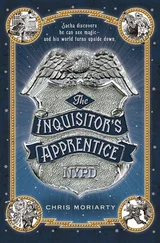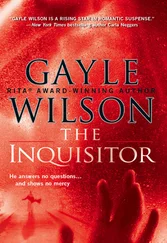Mark Smith - The Inquisitor
Здесь есть возможность читать онлайн «Mark Smith - The Inquisitor» весь текст электронной книги совершенно бесплатно (целиком полную версию без сокращений). В некоторых случаях можно слушать аудио, скачать через торрент в формате fb2 и присутствует краткое содержание. Жанр: Триллер, на английском языке. Описание произведения, (предисловие) а так же отзывы посетителей доступны на портале библиотеки ЛибКат.
- Название:The Inquisitor
- Автор:
- Жанр:
- Год:неизвестен
- ISBN:нет данных
- Рейтинг книги:5 / 5. Голосов: 1
-
Избранное:Добавить в избранное
- Отзывы:
-
Ваша оценка:
- 100
- 1
- 2
- 3
- 4
- 5
The Inquisitor: краткое содержание, описание и аннотация
Предлагаем к чтению аннотацию, описание, краткое содержание или предисловие (зависит от того, что написал сам автор книги «The Inquisitor»). Если вы не нашли необходимую информацию о книге — напишите в комментариях, мы постараемся отыскать её.
The Inquisitor — читать онлайн бесплатно полную книгу (весь текст) целиком
Ниже представлен текст книги, разбитый по страницам. Система сохранения места последней прочитанной страницы, позволяет с удобством читать онлайн бесплатно книгу «The Inquisitor», без необходимости каждый раз заново искать на чём Вы остановились. Поставьте закладку, и сможете в любой момент перейти на страницу, на которой закончили чтение.
Интервал:
Закладка:
Geiger had begun his education by studying the instincts and foundational choices of the pioneers. Certain methods and techniques were especially effective, including:
Sharpened objects. The Judas Chair proved so successful during the Inquisition that most European countries began customizing their own versions. Culla di Giuda, Judaswiege — by any name, it was a pyramid-shaped seat upon which the Jones, raised by ropes, was perched.
Encasement and pressure. The Iron Maiden, an upright sarcophagus, was fitted with interior spikes and apertures for the insertion of various sharp or pronged objects during an interrogation. It was also, to a degree, the ancestor of the sensory deprivation process. The buskin, Spanish Boot, and Malay Foot Press all used shrinkage and manipulation to break feet; the thumbscrew was limited to single digits, but an interrogator who carried one in his pocket could turn any place into a torture chamber.
Manacling and stretching. The rack was a technological advance, with its employment of rollers, gears, and handles, allowing one the ability to quickly increase or reduce physical pain by minute degrees.
Waterboarding was another brainchild of the Inquisition’s interrogators. They understood that whereas submerging a Jones in water might prove effective over time, waterboarding triggered the gag reflex almost instantaneously, heightening the fear of death.
Intense heat had always been a staple of the torturer’s trade-consider the phrase “putting one’s feet to the fire”-as had the ripping and flaying of flesh. Also useful was a wide array of tools, from the simple-such as pliers for denailing-to the complex-such as the Pear, a hinged and often exquisitely etched steel tool inserted into the vagina or anus and slowly expanded by means of a screw handle. The catalog of tools was extensive: the Wheel, the Cat’s Paw, the Head Crusher, the Crocodile Tube, the Picquet, the Strappado. All these and more had been invented before the Industrial Revolution, and Geiger had come to understand that the practice of torture was not an aberration. In the cause of expedience and the quest for information, man has always been willing to trump his laws and betray his beliefs to legitimize the torture of those who do not share them.
After much study and consideration, Geiger had devised a standard operating procedure. He worked only by referral. If a company or individual was in need of his services, they were directed to his website and given the password. Harry, his partner, would immediately review the request; if he didn’t see any red flags, he asked the potential client to send some preliminary information about the Jones. Then Harry started digging, and within a couple of days he put together a detailed profile. Harry was prickly, but there was no one better at what he did. He could find out things about a Jones that the spouse or best friend didn’t know, the government didn’t know, even the Jones didn’t know. Once Geiger read the dossier, he would tell Harry whether the job was a go.
Geiger had three rules. He didn’t work with children, though Harry had never received such a request. He didn’t work with people who’d had coronary events in the past. And he didn’t work with people over seventy-two-Geiger had reviewed studies showing that the risk of heart attack and stroke rose to unacceptable levels after that age.
But there was one gray area: the asap. Geiger’s corollary to “Everything matters” was “A Jones is not the perfect sum of his or her parts.” So if a client wanted an asap-a rush job-Geiger would often decline. There was so much to take in: body language, verbal response, vocal tone, facial expressions, a constant stream of information that shaped his choices and decisions-and a miscalculation or an incorrect conclusion, no matter how minor, could blow up a session or even tear a hole in his private universe. Which is why Geiger preferred to work inside out and follow a game plan based on Harry’s research. Some pros, like Dalton, worked from the outside in and used a more single-minded, head-on application of brutality. But with this approach, the client couldn’t always be sure what shape the Jones would be in when the session was over-although in some cases, that wasn’t an issue.
Geiger, like everyone in the IR business, had heard a number of stories about Dalton. The most famous one dated from Desert Storm, when Kuwaiti cops caught one of Saddam’s henchmen sneaking across the border. They worked on the Iraqi for a week and got nothing, so they brought Dalton over and gave him carte blanche. That kind of session was called a “norell,” short for “no release likely,” meaning that it would probably be unwise to allow the world to see the Jones again after the interrogation was completed. The first time Dalton asked a question, the Iraqi smiled and Dalton sliced off a lip with a rotary knife. Then he went to work with a pneumatic nail gun-and the Jones gave Dalton what he wanted. The story may have been apocryphal, but it made Dalton’s career. In IR it didn’t hurt to have that reputation-that you were capable of anything-because most clients saw the Jones as the enemy and, in truth, wanted more than recompense or enlightenment. They wanted their pound of flesh.
The way Geiger saw it, politics, business, and religion were the three remaining fingers of a battle-scarred fist. Truth, meanwhile, was a weapon that even a damaged fist could still grasp and wield. It was a remarkably versatile commodity; it could be traded, or help serve an end, or produce a profit. But it was an unstable element with a short half-life, so it had to be used quickly, before it blew up in the client’s face. Early on, Geiger had learned that truth was no longer sacred-it was simply the hottest thing on the market, and anyone in IR who believed that they acted within the parameters of some righteous code was at the very least deluded.
The cat jumped from Geiger’s shoulder to the porch railing and went on his nightly way. Without fail, he would be back around five A.M.; the creature’s clock was a nearly perfect thing.
The spider had finished its night’s work. A large, striped moth was already caught dead center in the web, struggling furiously, not knowing that the more it tried to free itself, the tighter its shackles grew. Moving without haste, the spider came down from the web’s upper right-hand corner. It demonstrated no sense of urgency, as if the ends were secondary to the means, the meal simply a by-product of the art that had snared it.
Geiger lit another Lucky, and as the spider reached its prize Geiger put his lighter’s flame to an anchoring strand. The web, moth, and spider all went up in a puff of fire.
Geiger decided not to think about his action just now, and headed back inside. He would talk about it with Corley tomorrow.
2
Dr. Martin Corley stood at the railing of his eighteenth-floor terrace, drew on his between-sessions Marlboro Light, and frowned. Since he’d switched from the regular brand, this ritual had become the latest in a series of unsatisfying acts of self-denial intended to ward off incursions of mortality. It hadn’t been the milestone of sixty that had whetted his focus and pushed him away from old habits but the aftermath of his divorce. The long marriage and its countless traditions, however threadbare and static, had provided a numbing continuity, a sameness that masked the passing of time. Since Sara had left, it was his aloneness that informed him, daily, of his age and the potential for further deterioration. First came the shift to one percent milk instead of cream in his coffee. Next came Diet Coke instead of the real thing, trading flavor for the chemical aftertaste. Then Amstel Light, which required an act of self-delusion for him to believe he was drinking beer. Now this joyless sucking of thin smoke, waiting for the hop in his pulse that no longer came. Without the attendant pleasure, smoking was unmasked for what it was-an addiction perpetuated by a mind grown too indolent to explore itself with the diligence it brought to the terrain of others.
Читать дальшеИнтервал:
Закладка:
Похожие книги на «The Inquisitor»
Представляем Вашему вниманию похожие книги на «The Inquisitor» списком для выбора. Мы отобрали схожую по названию и смыслу литературу в надежде предоставить читателям больше вариантов отыскать новые, интересные, ещё непрочитанные произведения.
Обсуждение, отзывы о книге «The Inquisitor» и просто собственные мнения читателей. Оставьте ваши комментарии, напишите, что Вы думаете о произведении, его смысле или главных героях. Укажите что конкретно понравилось, а что нет, и почему Вы так считаете.












